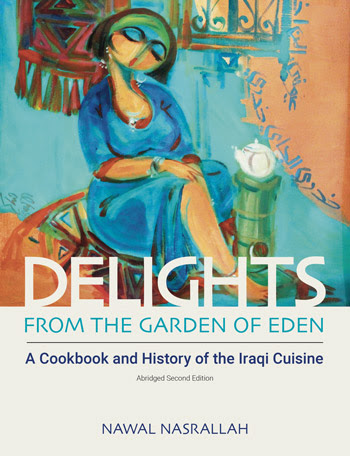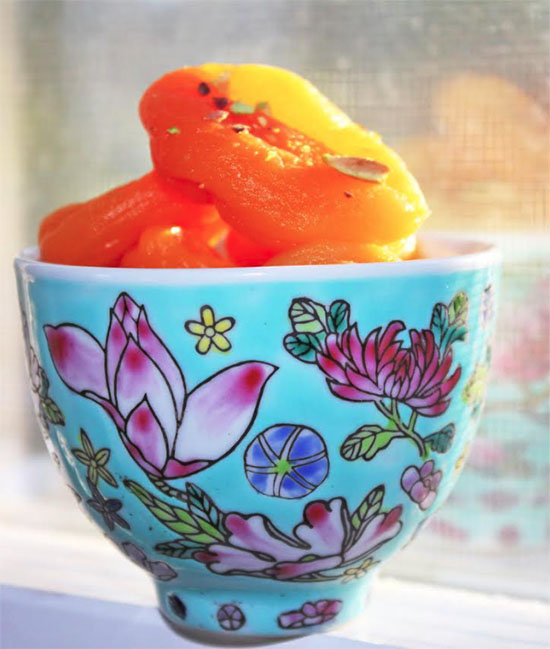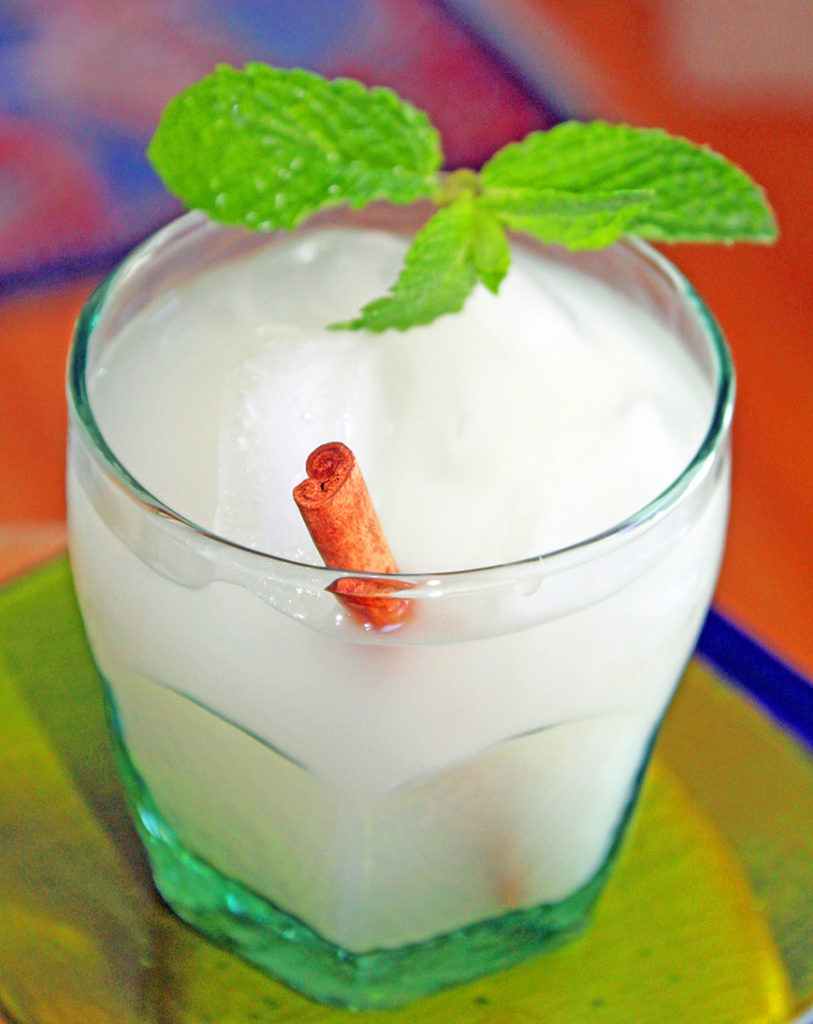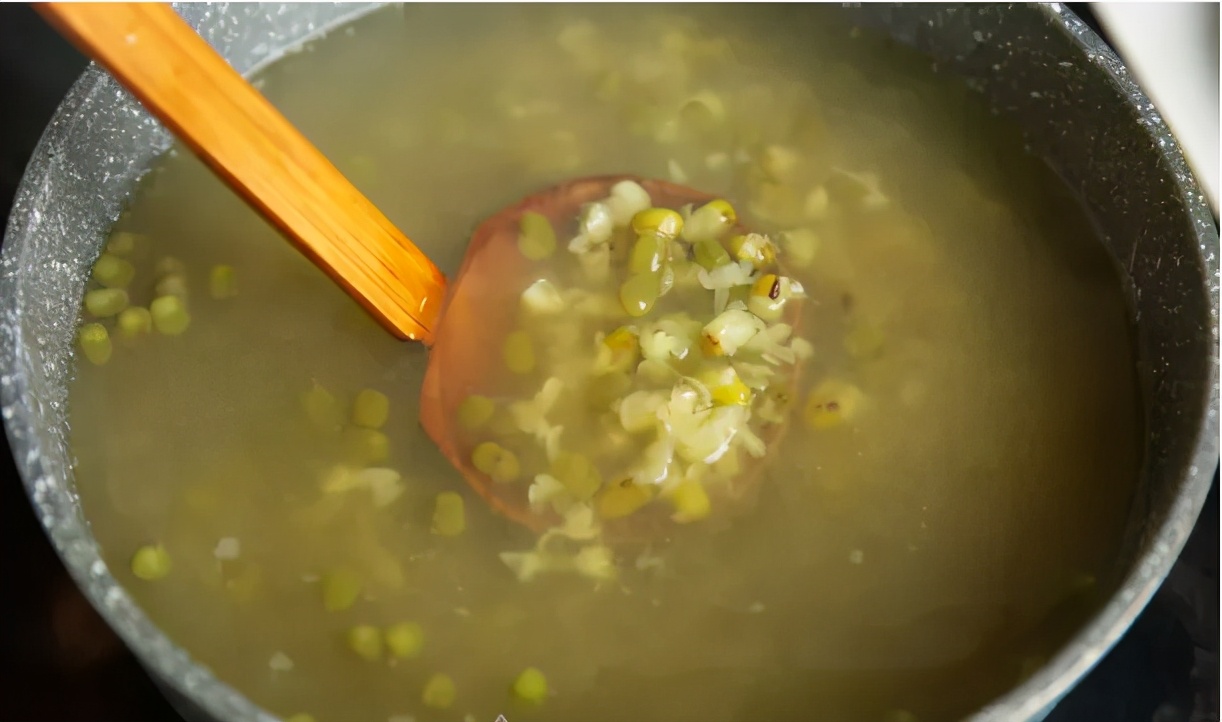Nawal Nasrallah
 After long hours of abstaining from food and drink, it is always a concern how to keep our bodies hydrated and cooled. We naturally seek foods and drinks known to deliver in this respect. Drinks made with tamarind and apricot paste (qamar ‘l-dīn) , for instance, are at the top of the list. There is also a dish commonly known today as khushaf, which is made in many different ways. Basically, it is dried fruits moistened or boiled in sugary solutions. The term is Turkish, which itself is derived from Persian, khoshab, a combination of khosh+ab (moist, juicy). Its name is naqūʿ (moistened) in Arabic.
After long hours of abstaining from food and drink, it is always a concern how to keep our bodies hydrated and cooled. We naturally seek foods and drinks known to deliver in this respect. Drinks made with tamarind and apricot paste (qamar ‘l-dīn) , for instance, are at the top of the list. There is also a dish commonly known today as khushaf, which is made in many different ways. Basically, it is dried fruits moistened or boiled in sugary solutions. The term is Turkish, which itself is derived from Persian, khoshab, a combination of khosh+ab (moist, juicy). Its name is naqūʿ (moistened) in Arabic.
As we learn from medieval naqūʿ recipes that survived in 14th-century Egyptian cookbook, Kanz al-Fawāʾid fī Tanwīʿ al-Mawāʾid كنز الفوائد في تنويع الموائد, only apricots were used, and they were steeped —not cooked—in the sugary solution. One of them was particularly singled out for Ramadan (recipe given below).
To the medieval Arab physicians and botanists, it was a dish to be esteemed. 12th-century botanist Ibn al-Bayṭār, for instance, once wrote, “I do not think there is any kind of food that cools the stomach more than naqūʿ.” So, let’s heed the wisemen’s advice and make naqūʿ for Ramadan, a time when our bodies most need it.
From the same book, we also come across a Ramadan drink made with malted barley, called māʾ al-shaʿīr, literally ‘barley water’ (recipe below). It was believed to aid digestion and quench thirst. How cool can this be!
Here are the two recipes, delicious, and worth trying:

Recipe for نقوع naqūʿ (steeped apricots)
Take dried apricots and wash them with water until all the sand and impurities are removed. Spread them in the sun to dry. Take a suitable amount of vinegar, and add sugar to it to sweeten it. Also add ½ dirham (¼ teaspoon) saffron, as well as aṭrāf ṭīb (spice blend), musk, rosewater, as needed. Stir this liquid seasoning mix (mizāj) by hand, and then set it aside from early in the morning until noon, all the while keeping the apricots in the sun [to dry].
Now, take a wide-mouthed jar (barniyya), either porcelain (ṣīnī) or ceramic (qīshānī); wash it, dry it, and perfume it with the smoke of aloeswood and ambergris. Close the opening of the jar [while doing this,] so that it is infused with enough smoke (bakhūr).
Take the apricots, put them in the jar and pour on them the prepared liquid. Top the surface with musk and rosewater, and set it aside for a while. [The apricots are eaten, and] the liquid is served in small bowls (sakārij) as a sweet and clear drink after filtering it.
For Ramadan days, make it early in the morning and serve it in the evening [with the ifṭār meal]. During the non-fasting days, make it at night and serve it the following morning.

Recipe for a drink of malted barley (māʾ al-shaʿīrماء الشعير ) for the month of Ramadan
Take picked over barley grains, soak them in water overnight and drain them early the following morning. Spread them on a large basket, and weigh them down [by covering them with chard leaves and stones spread on top]. Wait until they sprout, and then dry them in the sun, and finely grind them into flour.
Now, take ½ qadaḥ (a little under half a kilo, or approx. 1 pound) of this flour, as well as ¼ qadaḥ wheat flour, and put them in an earthenware tub (mājūr). Separately, boil water in a large pot; pour a little of it first into the tub, and stir it with a ladle, then add the rest of the hot water—enough to submerge the flour mix. Set it aside for the rest of the day and overnight, so that it sours. Early in the morning, add more cold water to fill the tub, and set it aside for two more days.
On the third day, add leaves of citron (turunj) and sour orange (nāranj) to it, along with leaves of rue and mint. Cut 10 lemons in half and add them to the tub. Add just enough salt to give it a pleasant taste. In the evening of that day, take the amount you want to serve, strain it, squeeze some lemon juice into it, add sugar, musk, and rosewater, and it will be ready to drink.
A Bowlful of Soup for Ramadan
In the Arab world, it is not customary to offer soup on a daily basis as an appetizing course that heralds a meal, as is done in the Western regions, for instance. Oftentimes, soup is the main dish itself, certainly with some bread, perhaps along with salad, a sandwich and the like. The soups we make are quite substantial, what with the vegetables, beans, grains, optional cuts of mutton on the bone or meatballs. That is, except when it is Ramadan.
For Ramadan, no Iftar meal is complete without a bowlful of soup to start the meal, to hydrate and prepare the system for the feast to follow.
As a variation on the customary Ramadan lentil soup (shorbat ʿadas), here is one made with mung beans, very popular in Iraq. It is also quite appropriate for the dawn meal (saḥūr), nourishing and satisfying. Ramadan Karīm.
The following recipe is from my cookbook Delights from the Garden of Eden.
Shorbat Māsh (Soup of Mung Beans شوربة ماش)
1½ cups (12 oz) whole mung beans, washed and soaked for an hour, and drained
2 teaspoons salt
1 teaspoon ground cumin
¼ teaspoon black pepper
2 tablespoons olive oil
1 medium onion, finely chopped
2 tablespoons flour
½ teaspoon turmeric
Lemon juice, to taste
In a medium heavy pot, put the mung beans and cover them by two inches or more with cold water. Bring the pot to a quick boil, skimming froth as needed, then reduce heat to low. Let it simmer gently, covered, for about 30 minutes, or until the mung beans soften. Stir in salt, cumin, and pepper.
In a small skillet, sauté the chopped onion in oil until golden brown. Stir in the flour and turmeric and fold until the mix emits a fragrance, less than a minute. Immediately empty the skillet into the pot, and stir. To deglaze the skillet, add a ladleful of the soup to it, stir it to dislodge any flour and onion that might have stuck to it, and empty it into the soup pot. Simmer it for additional five minutes, and serve it with a squeeze of lemon.
Bon appetit, sahtain!




